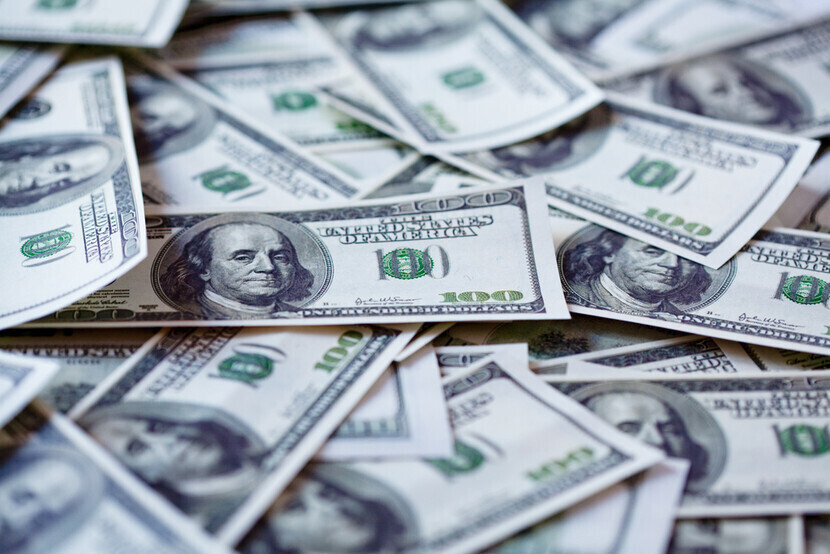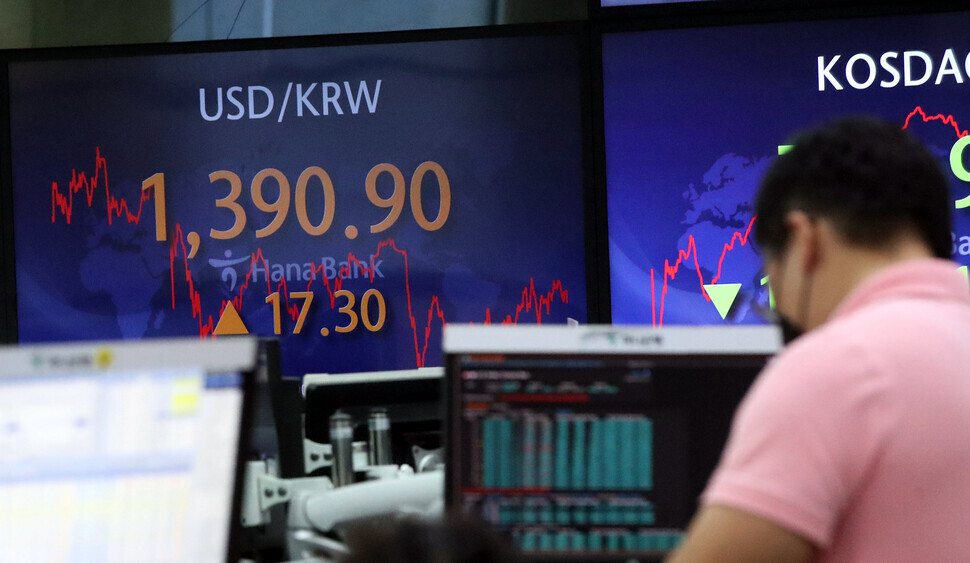hankyoreh
Links to other country sites 다른 나라 사이트 링크
Strong dollar met with jeers from some Korean industries, cheers from others

South Korean industries are on edge as the exchange rate approaches 1,400 won to the US dollar.
While some exporting businesses stand to secure price competitiveness as the won’s value slides, many companies that purchase raw materials in dollars to make their products appear likely to face declining profitability.
Also, the weakness of other major world currencies relative to the dollar means that companies are unlikely to benefit from much of a price competitiveness boost for their exports as the exchange rate rises.
The aviation industry is facing the biggest worries. Airlines pay for fuel and leases in dollars, which means the rising exchange rate will inevitably jack up costs.
Every 10-won difference in the exchange rate translates into a currency conversion difference of 35 billion won for Korean Air and 28.4 billion won for Asiana Airlines.
The major airlines already saw the currency conversion balance turn into a loss during the second quarter amid the effects of the high exchange rate. A higher exchange rate will inevitably translate into bigger losses.
Korean Air has been reducing its borrowing in dollars by increasing its won-denominated fixed-interest borrowing and diversifying its borrowing into other currencies such as the yen. The company hopes to be able to guard itself against some of the exchange losses through strong cargo performance and higher foreign-denominated earnings.
In the automobile industry, the impacts are different for the makers of finished vehicles and the companies that make parts.
With exports accounting for a large part of their business, finished vehicle makers gain in price competitiveness from a high exchange rate. But for component makers that have to import raw materials, a higher exchange rate means bigger losses — for reasons that have to do with their inability to immediately reflect the rise in raw material purchasing costs in the prices of the parts they provide.
“The finished car companies aren’t making up for the rise in costs,” said Daelim University automotive engineering professor Kim Phil-soo.
“At the industry level, they should be sharing the gains from the effects of the exchange rate,” he suggested.

Steelmakers and other companies that typically conduct their import and export translations in foreign currencies tend not to be heavily affected by exchange rate fluctuations.
When the exchange rate fluctuates, the rise in earnings from exports generally offsets the rise in import costs. South Korea’s steel industry imports over 100 million metric tons of iron ore and coking coal per year, but it also ranks fourth in the world in export volumes.
“We’re working to minimize the negative impact of increased exchange rate volatility on our business activities by means of projections based on different scenarios,” a POSCO official said.
“We respond with a sort of ‘natural hedge’ on an everyday basis by using the foreign currency earned through steel product exports to purchase major raw materials such as bituminous coal and iron ore,” they added.
South Korean gaming companies are anticipating returns from the high exchange rate.
Netmarble, which recorded 85% of its sales overseas in the second quarter, is very likely to benefit from the exchange rate difference, with North America accounting for around half its sales. Krafton and Pearl Abyss are also looking forward to gains from the exchange rate, with more than 80% of their sales coming from overseas.
But the companies also face the burden of growing costs associated with overseas projects, including payments for intellectual property.
“We could end up recording exchange losses from using dollars to pay overseas intellectual property costs for things like ‘Marvel: Future Fight,’ and from repaying interest on borrowings for the acquisition of foreign corporations,” a Netmarble official predicted.
A Korea Chamber of Commerce and Industry source said, “Companies with a lot of dollar-denominated liabilities will face a bigger burden with interest and repayment, and there’s also a large financial risk associated with large-scale overseas investment.”
“If the exchange rate remains high for the long term, major corporations are going to have to readjust their investment plans when they develop their management plans for next year,” the source predicted.
By Kim Hoe-seung, senior staff writer
Please direct questions or comments to [english@hani.co.kr]

Editorial・opinion
![[Editorial] Yoon must halt procurement of SM-3 interceptor missiles [Editorial] Yoon must halt procurement of SM-3 interceptor missiles](https://flexible.img.hani.co.kr/flexible/normal/500/300/imgdb/child/2024/0501/17145495551605_1717145495195344.jpg) [Editorial] Yoon must halt procurement of SM-3 interceptor missiles
[Editorial] Yoon must halt procurement of SM-3 interceptor missiles![[Guest essay] Maybe Korea’s rapid population decline is an opportunity, not a crisis [Guest essay] Maybe Korea’s rapid population decline is an opportunity, not a crisis](https://flexible.img.hani.co.kr/flexible/normal/500/300/imgdb/original/2024/0430/9417144634983596.jpg) [Guest essay] Maybe Korea’s rapid population decline is an opportunity, not a crisis
[Guest essay] Maybe Korea’s rapid population decline is an opportunity, not a crisis- [Column] Can Yoon steer diplomacy with Russia, China back on track?
- [Column] Season 2 of special prosecutor probe may be coming to Korea soon
- [Column] Park Geun-hye déjà vu in Yoon Suk-yeol
- [Editorial] New weight of N. Korea’s nuclear threats makes dialogue all the more urgent
- [Guest essay] The real reason Korea’s new right wants to dub Rhee a founding father
- [Column] ‘Choson’: Is it time we start referring to N. Korea in its own terms?
- [Editorial] Japan’s rewriting of history with Korea has gone too far
- [Column] The president’s questionable capacity for dialogue
Most viewed articles
- 1Months and months of overdue wages are pushing migrant workers in Korea into debt
- 2At heart of West’s handwringing over Chinese ‘overcapacity,’ a battle to lead key future industries
- 3[Editorial] Yoon must halt procurement of SM-3 interceptor missiles
- 4Trump asks why US would defend Korea, hints at hiking Seoul’s defense cost burden
- 5Under conservative chief, Korea’s TRC brands teenage wartime massacre victims as traitors
- 6Fruitless Yoon-Lee summit inflames partisan tensions in Korea
- 7[Guest essay] Maybe Korea’s rapid population decline is an opportunity, not a crisis
- 8[Column] For K-pop idols, is all love forbidden love?
- 9[Editorial] 10 years on, lessons of Sewol tragedy must never be forgotten
- 10[Editorial] When the choice is kids or career, Korea will never overcome birth rate woes